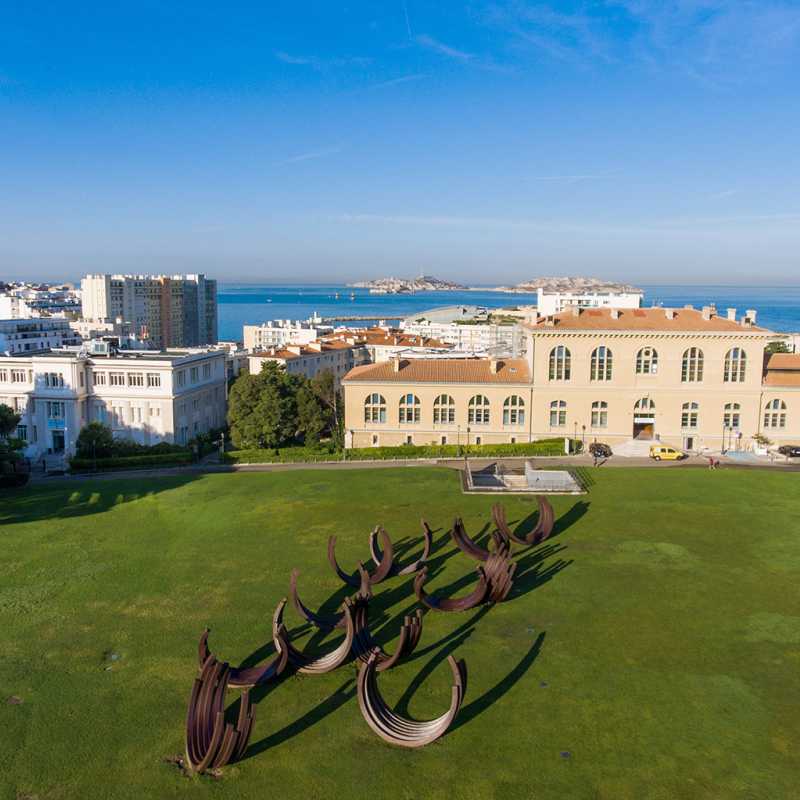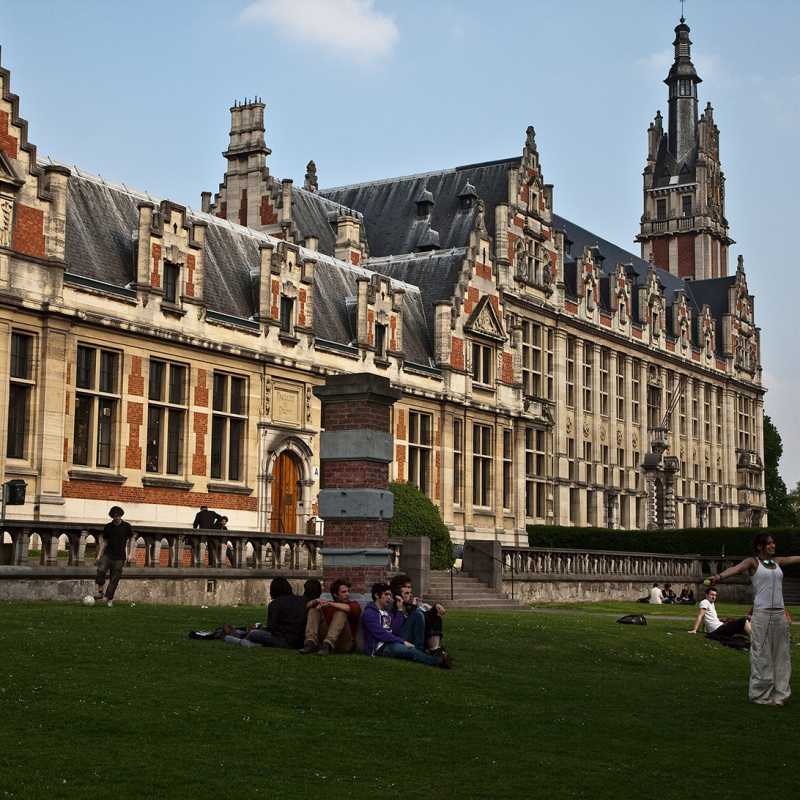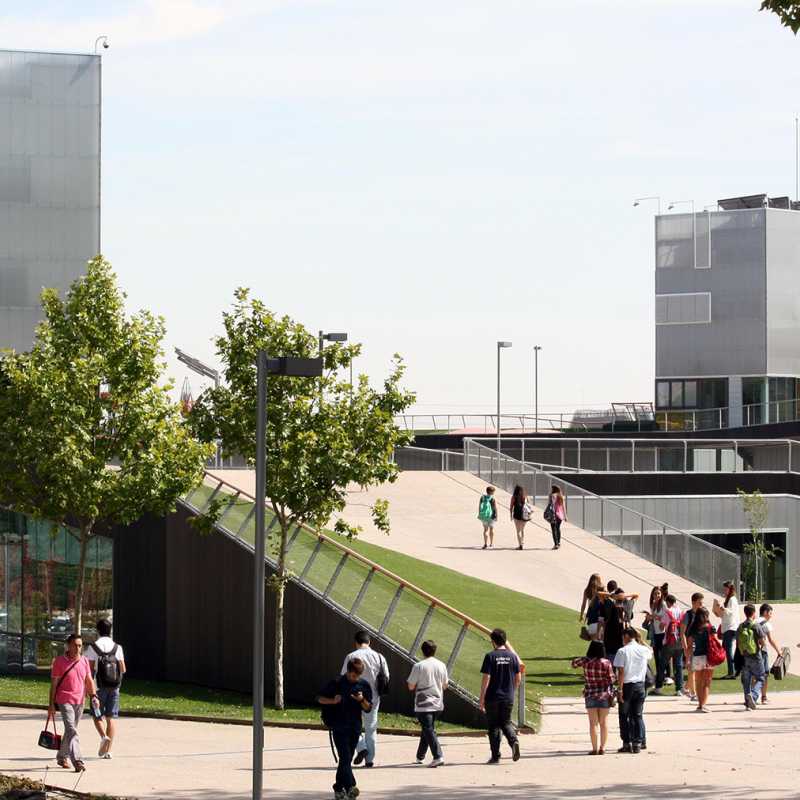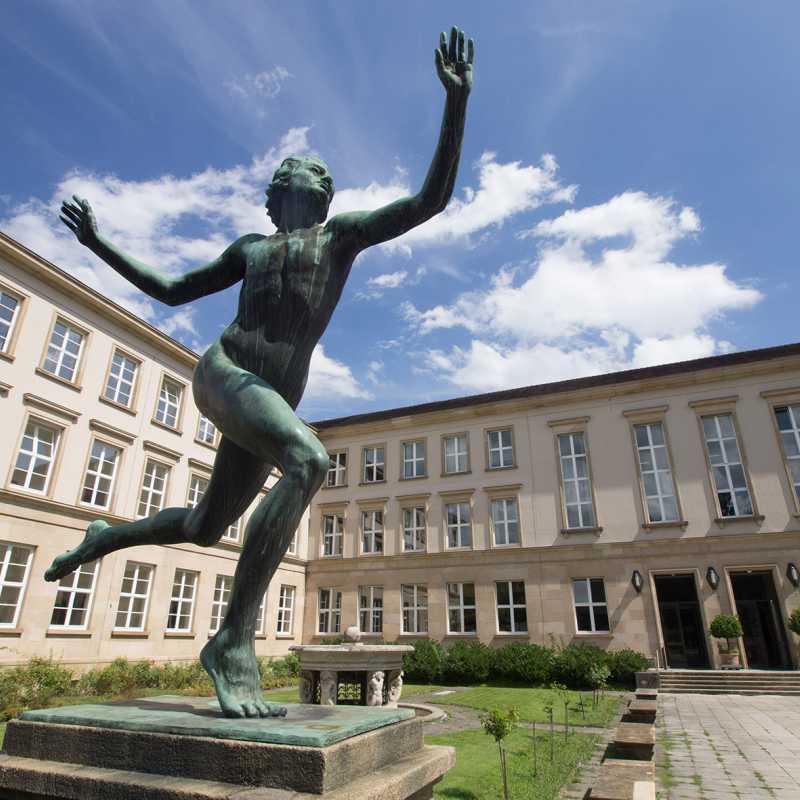The University of Tübingen, member of the PREVENT-nCOV consortium has been awarded an EU grant of €2.7million for their COVID-19 vaccine development programme. The consortium aims to develop and test a vaccine for COVID-19 in PHI/IIa clinical studies within 12 months. The consortium members are AdaptVac (Lead partner of the project); Institute for Tropical Medicine (ITM) at University of Tübingen; Department of Medical Microbiology, Leiden University Medical Center; Department of Immunology and Microbiology, University of Copenhagen; ExpreS2ion Biotechnologies, and Laboratory of Virology, Wageningen University.
https://www.medizin.uni-tuebingen.de/de/das-klinikum/einrichtungen/kliniken/medizinische-klinik/tropenmedizin
-
The influence of the Coronavirus crisis on earning expectations and the economy in the USA - School of Business and Economics
In an international research project, Tübingen-based economist Professor Gernot Müller has surveyed 200 households in the USA every day since 10 March 2020 about their expectations and fears in the face of the coronavirus crisis. The project involves researchers from the Universities of Tübingen and Bonn in Germany, and Brandeis in the United States. Households are asked what effects they expect the coronavirus pandemic to have on GDP in the US, and on their personal income. They are also asked about their inflation expectations. At the same time, the researchers are monitoring whether the pandemic is influencing behavior - for example, whether households are savings more. A model analysis is then used to quantify the impact of these expectations on economic development in the United States.
https://uni-tuebingen.de/en/news-default/article/coronavirus-beeintraechtigt-konjunktur-menschen-in-den-usa-erwarten-tiefe-rezession-1/?tx_news_pi1%5Baction%5D=detail&cHash=5813e7cff680464ffe7a9f72c9c1ae61
-
Effects of the Coronavirus pandemic on high-performance sport - Dept of Sports Medicine
What are the effects of the Coronavirus pandemic on high-performance sport? Researchers at the Sports Medicine section of the Tübingen University Hospitals are exploring that question, headed by Professor Dr. Christof Burgstahler. They have developed an online survey which is being publicized by four major German sports association and the state of Baden-Württemberg’s sports governing body. More than 600 sportsmen and 600 sportswomen did so in the first eight days alone. The respondents included 278 professional sportspersons, 471 top German athletes, and 564 top state athletes. 406 members of a national team are also in the group.
https://www.medizin.uni-tuebingen.de/de/das-klinikum/pressemeldungen/258?press_str=
-
What effect is the Coronavirus pandemic having on people with mental illnesses? - Department of Psychology
How are people with anxiety and depression managing their day-to-day lives amid the Coronavirus pandemic? How do those affected by eating or compulsive disorders, acoustic or optical hallucinations, or panic attacks deal with the pandemic? And how do those with mental illnesses generally fare in comparison with the rest of the population? This and other questions are being explored by the University of Tübingen working group in Clinical Psychology and Psychotherapy, headed by Professor Dr. Jennifer Svaldi in cooperation with the Universities of Münster and Osnabrück. More than 2000 people with and without mental disorders have voluntarily taken part in the online study.
-
Effects of the Coronavirus pandemic on the wellbeing of children and teenagers
Countries around the world have taken drastic measures to contain the COVID-19 pandemic. They include the temporary closure of schools, kindergartens, sportsgrounds, playgrounds and social institutions, as well as a shift to forms of online learning within the framework of homeschooling.
In a collaboration between Professor Dr. Sascha Neumann of the University of Tübingen Institute of Education (IfE) and the University of Luxembourg, an international study was launched on 07 May 2020 to investigate the effects of these measures on the wellbeing of children and teenagers, depending on their families’ socio-economic situation. The study’s goal is to obtain data on the short- and middle-term consequences for kids and young people which arise from the measures to contain the pandemic and which should be considered in future political decision-making.
https://covid-kids-survey.uni.lu
-
Research project: Studie zur Immunantwort auf das Coronavirus - Medizinische Klinik - Translational Immunologie
The Department of Immunology at the University of Tübingen is working on a project to develop new diagnostic, prophylactic and therapeutic measures for COVID-19 disease, which is triggered by the novel coronavirus SARS-CoV-2. To this end, the team is currently examining blood samples from people who have had a positive history of the virus (SARS-CoV-2) in order to analyze whether and how the immune system recognizes the virus.
https://www.medizin.uni-tuebingen.de/de/das-klinikum/einrichtungen/kliniken/medizinische-klinik/kke-translationale-immunologie/corona-studie-blutspender-gesucht
-
Development and testing of a vaccine effective against COVID-19 - Institute of Tropical Medicine, Travel Medicine and Human Parasitology
An international consortium involving the Institute of Tropical Medicine, Travel Medicine and Human Parasitology at the University of Tübingen and the Tübingen University Hospitals has received an EU Horizon 2020 Grant for the development and testing of a vaccine against COVID-19 in clinical trials. The consortium also includes the Department of Immunology and Microbiology at the University of Copenhagen (Denmark), the two companies AdaptVac and ExpreS2ion Biotechnologies (both in Denmark), the Department of Medical Microbiology at Leiden University Hospital (Netherlands) and the Laboratory of Virology at Wageningen University (Netherlands). The project partners are world leaders in their respective fields of research and cover all the relevant sub-areas of virus research and vaccine development necessary for the rapid clinical development of a vaccine against COVID-19.
https://www.medizin.uni-tuebingen.de/files/view/W0nPpDMa6lLgzbJo9VGLXAbO/200309%20Press%20release%20Covid-19%20consortium_final.pdf
-
Clinical testing of a potential vaccine developed by the CureVac company
With the support of the Coalition for Epidemic Preparedness Innovations (CEPI), the Tübingen-based company CureVac AG is working on the development of a vaccine against the new coronavirus SARS-CoV-2. The Institute of Tropical Medicine, Travel Medicine and Human Parasitology at the University of Tübingen and the Tübingen University Hospitals will carry out the first clinical trials of the potential vaccine developed in this research project.
The biopharmaceutical company CureVac was established with sponsorship from the University of Tübingen and is a pioneer in the preclinical and clinical development of mRNA-based drugs and vaccines. CEPI is a public-private partnership for accelerating the development of vaccines against emerging infectious diseases and is co-funded by Germany’s Ministry of Education and Research.
The agreement builds on the existing partnership between CureVac and CEPI to develop a rapidly deployable vaccine platform. It includes up to 8.3 million US dollars in funding from CEPI for accelerated vaccine development, manufacturing and clinical trials.
https://www.bmbf.de/de/curevac-und-cepi-bauen-kooperation-zur-entwicklung-eines-impfstoffs-gegen-das-coronavirus-10797.html
-
Potential target in the fight against Coronavirus SARS-CoV-2 - Dept of Computer-Based Systems Biology of Infections
The Tübingen bioinformatics specialists, assistant professor Dr. Andreas Dräger, Alina Renz and Lina Widerspick from the Department of Computer-Based Systems Biology of Infections were able to identify a potential drug target for the treatment of the infectious disease COVID-19. In flow balance analyses (FBA), switching off a human enzyme stopped the reproduction of the virus without impairing cell growth. For their approach they used an integrated computer model with the novel coronavirus 2019-nCOV and human alveolar macrophages. The drug target identified is the enzyme guanylate kinase (GK1). GK1 inhibitors have already been described in the literature; their potential for treating COVID-19 infections is now to be tested experimentally.
https://doi.org/10.5281/zenodo.3752641
-
Development of a virus vector-based vaccine - Interfaculty Institute of Cell Biology
Tübingen immunologists Ralf Amann, Ferdinand Salomon and Melanie Müller of the Interfaculty Institute of Cell Biology (IFIZ) at the University of Tübingen are working with innovative platform technology to develop a vaccine against the Coronavirus SARS-CoV-2. They insert coronavirus antigens into a virus vector that is harmless to humans. Injection of this virus vector does not cause the disease in humans but instead triggers an immune reaction that is intended to protect against severe illness in the event of a subsequent infection. Various antigens may be introduced into the virus vector. Such a vaccine could therefore also provide protection against mutations of SARS-CoV-2 as well as against other coronaviruses. Germany’s Economics Ministry has put up additional funding of 1.3 million euros for the project, and the Carl Zeiss Foundation has made a further 150,000 euros available. The three researchers founded Prime Vector Technologies GmbH in October 2019.
https://uni-tuebingen.de/en/news-default/article/virusvektor-basierter-impfstoff-vorbereitung-des-immunsystems-gegen-infektion-mit-sars-cov-2/?tx_news_pi1%5Baction%5D=detail&cHash=17fc7f4029d28297078d49947fd67234
-
Covid-19 study on virus spread among children - Interfaculty Institute of Cell Biology
What role do children play in the spread of the Coronavirus? The Tübingen University Children’s Hospital - Department of Paediatrics is seeking the answer to that question with a new study - jointly with three other University medical centers, headed by Heidelberg. The initiative for the study came from State Premier Winfried Kretschmann; the state of Baden-Württemberg is to cover the cost of around 1.2 million euros.
https://www.medizin.uni-tuebingen.de/de/corona-kinderstudie
-
German COVID-19 OMICS Initiative (DeCOI)
How does the new Coronavirus (SARS-CoV-2) alter its genetic information? Which other infections occur in patients with COVID-19? Are there genetic risk factors which promote infections? Many genome researchers are pooling their expertise and sequencing infrastructure so as to make a scientific contribution to managing the COVID-19 pandemic. These activities are now being brought together officially in the German COVID-19 OMICS initiative (DeCOI), to accelerate research in the field. Researchers at more than 22 institutions are active in DeCOI - and that number is growing.
https://uni-tuebingen.de/en/university/news-and-publications/press-releases/press-releases/article/coronavirus-forschung-mit-vereinten-kraeften/?tx_news_pi1%5Baction%5D=detail&cHash=c6dea1bacc511bcd7609ef443494c6fe
-
CoroNotes - Tübingen AI Center
Scientists at the Tübingen AI Center, a joint facility of the University of Tübingen and the Max Planck Institute for Intelligent Systems, have developed CoroNotes in cooperation with physicians at the University Hospital Tübingen. CoroNotes is an app that collects urgently needed data on COVID-19 quickly and efficiently. The aim of the project is to support medical and scientific studies on the novel coronavirus and thus gain important insights into the spread and progression of COVID-19. The free app is now available in GooglePlay and will soon also be released in the Apple App Store.
https://uni-tuebingen.de/en/university/news-and-publications/press-releases/press-releases/article/coronotes-new-app-supports-medical-studies-on-covid-19-1/?tx_news_pi1%5Baction%5D=detail&cHash=aa36e204c2dcdfe0e12ba56bb821df30
-
Expert opinions on the current risk situation and on the measures taken
What do experts in the fields of virology, microbiology, hygiene, tropical medicine, immunology and internal medicine/ intensive care say about the current risks and measures regarding the Covid-19 pandemic? How reliable is the current state of knowledge? Researchers at the University Hospitals in Tübingen and Hamburg-Eppendorf launched a survey aimed at finding out.
-
Protective factors and physical health during the Covid-19 pandemic
Sebastian Wolf (Institute of Psychology and Institute of Sports Science) and Professor Gorden Sudeck (Institute of Sports Science), are investigating the protective effects of regular physical activities and social support on various parameters such as anxiety, depression and sleep disorders as a result of the Covid-19 pandemic. Their longitudinal study will look at the influence of changes to these factors at three points in time. A further goal is to create an empirical basis for the quick development of online modules to promote exercise and social support. The study is conducted via an online questionnaire.
https://uni-tuebingen.de/en/faculties/faculty-of-economics-and-social-sciences/subjects/department-of-social-sciences/sports-science/institute/departments/education-health-research/research/current-research-projects/schutzfaktoren-und-psychische-gesundheit-waehrend-der-covid-19-pandemie/
-
The Vietnamese-German Center for Medical Research in Hanoi at the University of Tübingen provided 6,000 swab tubes for a clinical study to develop a COVID-19 drug.
On 27 March 2020, the University of Tübingen, in cooperation with the Universities of Hamburg and Stuttgart, started a clinical study for the testing of a drug against the coronavirus. To carry out the study, smear tubes are necessary, which are currently not available in sufficient numbers in Germany. The Vietnamese-German Center for Medical Research (VG-CARE) in Hanoi has made 6,000 tubes available to support this study.
https://uni-tuebingen.de/en/university/news-and-publications/attempto-online/forschung/newsfullview-attempto-forschung/article/deutschland-und-vietnam-vereint-im-kampf-gegen-covid-19/





